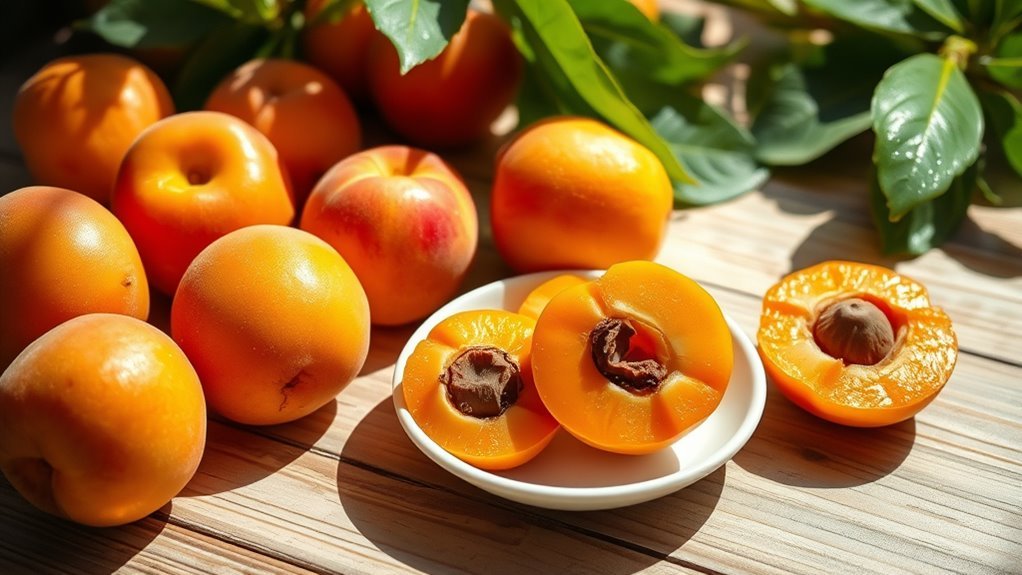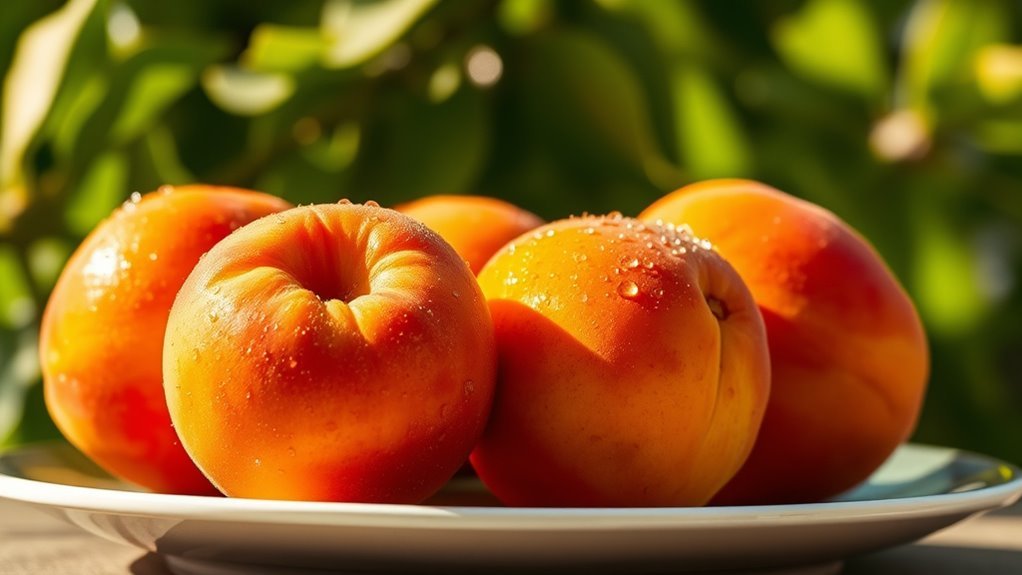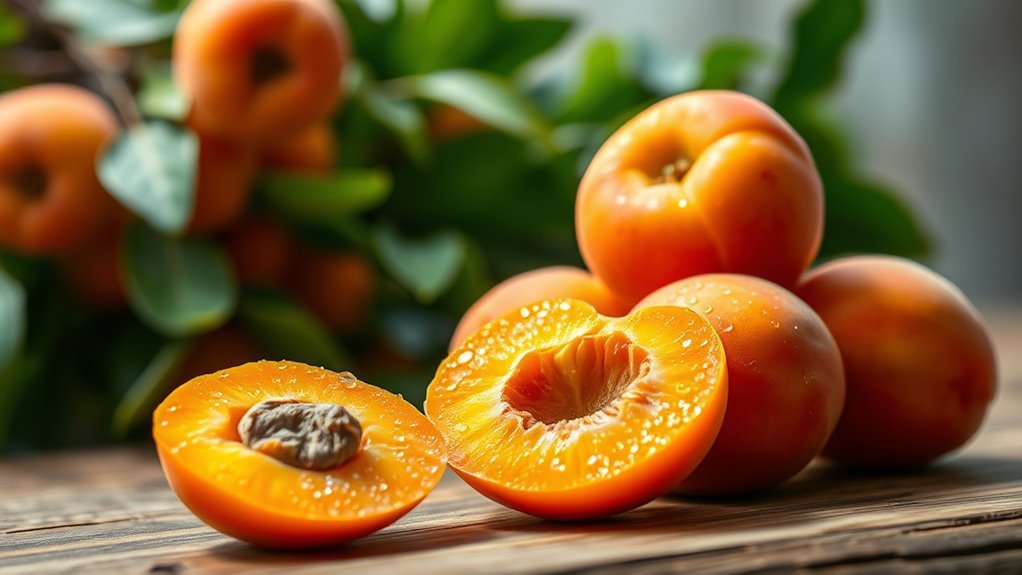Apricots aren’t considered fully keto-friendly due to their carb content, containing about 12 grams of carbs per 100 grams. While they offer health benefits like vitamins A and C, portion control is essential if you’re following a ketogenic diet. Limiting your intake to 1-2 apricots helps manage your daily carb allowance. If you want to know how to incorporate apricots into your keto lifestyle or explore alternatives, there’s more to discover.
Nutritional Profile of Apricots

When it comes to understanding the nutritional profile of apricots, you’ll find they pack a surprisingly robust array of vitamins and minerals. Different apricot varieties, such as the Turkish and Moorpark, can vary slightly in their vitamin content, but all are rich sources of vitamins A and C. These vitamins are essential for immune function and skin health, making apricots a fantastic addition to your diet. Additionally, they contain potassium, which supports heart health and regulates blood pressure. Eating apricots can also provide dietary fiber, promoting digestive health. So, whether you enjoy fresh, dried, or canned apricots, you’re benefiting from their diverse nutritional offerings while enjoying the freedom to choose how to incorporate them into your meals.
Carbohydrate Content and Keto Guidelines

The carbohydrate content of apricots plays an essential role in determining their suitability for a ketogenic diet. For those following keto restrictions, maintaining a strict carbohydrate balance is critical. Apricots, while nutritious, contain carbohydrates that can impact your daily intake.
Here’s a quick look at their carbohydrate content:
| Serving Size | Total Carbs (g) | Net Carbs (g) |
|---|---|---|
| 100g | 11.0 | 9.0 |
| 50g | 5.5 | 4.5 |
| 1 medium | 9.5 | 7.5 |
| 5 apricots | 14.0 | 12.0 |
As you can see, even small servings can add up, so it’s essential to keep track if you’re committed to staying within your carb limits.
Health Benefits of Apricots

Apricots offer a range of health benefits that can complement a balanced diet, even for those on a ketogenic plan. Packed with essential vitamins, apricot nutrition includes vitamin A, which supports eye health, and vitamin C, known for boosting your immune system. They’re also rich in antioxidants, helping to combat oxidative stress in your body. Additionally, apricots contain fiber, which can aid digestion and promote a feeling of fullness, aligning with your keto goals. Their potassium content contributes to heart health by regulating blood pressure. Including apricots in moderation can provide these health benefits while keeping your diet diverse and enjoyable. Just remember, balance is key, and apricots can be a delightful part of your health journey.
Portion Control and Serving Sizes
Understanding portion control is essential for incorporating apricots into your ketogenic diet without exceeding your carb limits. Apricots are delicious but can contribute to your daily carb intake if you’re not careful. A typical serving size is about four to six apricots, which contains approximately 12-15 grams of carbs. To enjoy them while staying keto-friendly, practice mindful eating; savor each bite and gauge your body’s hunger cues. By focusing on portion sizes, you can indulge in the sweetness of apricots without derailing your diet. Remember, balancing enjoyment and nutrition is key. It’s all about finding that sweet spot where you can appreciate the flavors while keeping your carbohydrate intake in check. Enjoy freedom in your choices!
Comparing Apricots to Other Fruits
When considering apricots in your diet, it’s helpful to compare their nutritional profile with that of other fruits. You’ll find that apricots have a unique balance of vitamins and minerals, along with lower sugar content than many popular options. Understanding their glycemic index can also aid in managing your keto lifestyle effectively.
Nutritional Profile Comparison
Although many fruits offer a range of nutritional benefits, apricots stand out with their unique profile, especially for those following a keto diet. Here’s how apricots compare to other fruits:
- Low in Carbs: Apricots contain fewer carbs per serving than many common fruits like bananas and grapes.
- Rich in Vitamins: They provide essential vitamins A and C, which support immune function and skin health.
- Fiber Content: Apricots offer a decent amount of fiber, aiding digestion while keeping you full.
- Variety Matters: Different apricot varieties can have varying flavors and nutritional values, with seasonal availability adding to their appeal.
Incorporating apricots into your diet can be a delicious way to enjoy nutritious fruits while staying within keto guidelines.
Sugar Content Analysis
While many fruits contain natural sugars that can impact your keto diet, apricots offer a relatively low sugar content, making them a favorable option. With about 3.9 grams of sugar per 100 grams, they stand out compared to sweeter fruits like bananas and grapes, which can greatly increase sugar absorption. Apricots’ lower fructose levels mean they’re easier on your body’s fructose metabolism, allowing you to enjoy a sweet taste without derailing your keto goals. If you’re mindful of your carbohydrate intake, incorporating apricots can provide essential nutrients without overwhelming your system with sugar. Ultimately, by choosing apricots over higher-sugar fruits, you can maintain your keto lifestyle while still savoring delicious flavors.
Glycemic Index Insights
Understanding the glycemic index (GI) of foods is essential for managing blood sugar levels, especially on a keto diet. Apricots, particularly certain apricot varieties, have a moderate GI, making them a better choice compared to many other fruits. Here are some key glycemic index factors to take into account:
- Apricots: GI of about 34.
- Berries: Generally lower, around 25-30.
- Apples: GI around 38, slightly higher than apricots.
- Bananas: notably higher, with a GI of about 51.
How to Incorporate Apricots Into a Keto Diet
If you’re looking to add a touch of sweetness to your keto diet, incorporating apricots can be a delicious option. Fresh apricots can be enjoyed in moderation, enhancing your meals without overwhelming your carb intake. You might consider blending apricots into low-carb apricot smoothies, paired with spinach or avocado for added nutrients. Dried apricots can be a tasty snack, but remember they’re higher in sugar; just a small handful can satisfy your cravings. Try adding chopped dried apricots to salads or keto-friendly granola for extra flavor. Always monitor your portions to maintain your carb goals while enjoying the unique taste and health benefits apricots offer in your keto lifestyle.
Recipes Featuring Apricots
As you explore the delicious world of apricots, you’ll find that they can elevate your keto meals in various creative ways. Here are some tasty recipes featuring apricots that you’ll love:
- Apricot Salsa: Combine diced apricots, red onion, cilantro, lime juice, and jalapeños for a invigorating topping on grilled meats.
- Apricot Chutney: Cook apricots with vinegar, spices, and a touch of sweetener to create a savory condiment perfect for cheese boards.
- Stuffed Chicken Breasts: Stuff chicken breasts with apricot and cream cheese for a flavorful, filling dish.
- Keto Apricot Muffins: Use almond flour and apricot puree for a low-carb take on a breakfast classic.
These recipes not only keep your carb count in check but also add a burst of flavor to your meals!
Potential Risks of Consuming Apricots on Keto
When considering apricots on a keto diet, you should be mindful of their carbohydrate content, which can add up quickly. There’s also the potential for sugar spikes, particularly if you consume them in larger quantities. Portion control becomes essential, as enjoying apricots in moderation is key to maintaining your keto goals.
Carbohydrate Content Concerns
Although apricots are often praised for their nutritional benefits, their carbohydrate content can pose challenges for those following a strict keto diet. While they can be tasty, it’s essential to evaluate how they fit into your macros. Here are some carbohydrate content concerns:
- Moderate Carbohydrate Sources: Apricots contain about 12 grams of carbs per 100 grams, which can add up quickly.
- Portion Control: Eating multiple apricots can easily exceed your daily carb limit.
- Keto Friendly Fruits: You might find other fruits with lower carb counts more suitable.
- Impact on Ketosis: Consuming too many carbs from apricots could hinder your progress in maintaining ketosis.
Being mindful of these factors can help you enjoy apricots while staying aligned with your keto goals.
Sugar Spike Potential
Consuming apricots on a keto diet can lead to potential sugar spikes due to their natural sugars, which may affect blood glucose levels. While apricots offer vitamins and fiber, their carbohydrate content can lead to increased sugar absorption, especially if eaten in larger quantities. This spike in blood glucose can be particularly concerning for those who are sensitive to sugar fluctuations or managing diabetes. It’s important to monitor how your body responds to apricots and consider their potential impact on your overall carb intake. By being aware of how these fruits affect your blood glucose, you can make more informed choices and maintain the freedom you desire in your dietary journey while staying true to your keto goals.
Portion Control Challenges
While enjoying apricots can add a burst of flavor to your keto meals, portion control becomes an essential factor in managing your carbohydrate intake. To keep your diet on track, consider these portion sizes and serving frequency:
- Limit to 1-2 apricots per serving to control carbs.
- Space servings out to 2-3 times a week to avoid excess sugar.
- Combine with high-fat foods to balance the carb content.
- Track your daily intake to guarantee you stay within your limits.
Alternatives to Apricots for a Keto Diet
What if you’re craving the sweet, tangy flavor of apricots but want to stick to your keto diet? You’ve got plenty of alternatives! Consider berries like raspberries and blackberries, which are both keto friendly fruits and low in carbs. They offer a delightful sweetness and can easily satisfy your cravings. You might also try avocado, which provides healthy fats and a creamy texture. For a crunch, munch on nuts like almonds or walnuts; they’re nutrient-dense and great for snacking. Finally, don’t forget about cucumber or bell peppers, which can be invigorating and low in carbs. Exploring these options can help you maintain your freedom in enjoying delicious flavors while staying committed to your keto journey.
Frequently Asked Questions
Can I Eat Dried Apricots on a Keto Diet?
You might be wondering if you can enjoy dried apricots on your keto journey. But hold on—dried fruit often comes with a hidden carb count that could derail your progress. While they’re delicious and packed with nutrients, a small serving can contain over 20 grams of carbs. If you’re aiming for a strict keto lifestyle, you’ll need to be cautious. Moderation is key, so keep an eye on your total daily carb intake!
How Do Apricots Affect Ketosis Levels?
When you consider how apricots affect ketosis levels, it’s vital to look at their glycemic impact. Apricots have a relatively low glycemic index, meaning they won’t spike your blood sugar like some other fruits. However, if you’re focused on strict ketosis food choices, moderation is key. Eating a small amount might not disrupt ketosis, but too many can lead to increased carb intake, affecting your overall ketogenic state. Balance is important!
Are Apricot Seeds Safe for Keto Consumption?
When considering apricot seeds for your keto diet, it’s important to weigh their nutritional benefits against potential risks. While they contain healthy fats and fiber, they also have amygdalin, which can convert to cyanide in the body. Consuming small amounts might be safe, but it’s best to avoid large quantities. Always consult a healthcare professional before adding new foods to your diet, ensuring you prioritize both health and freedom in your choices.
Can Apricots Be Included in Meal Prep?
You’d think including apricots in your meal prep would be a no-brainer, right? Well, they do offer meal prep benefits! Their natural sweetness can elevate your dishes, and they’re perfect for apricot recipes like smoothies or salads. Just remember, moderation’s key. While they add flavor and nutrients, balancing them with other low-carb ingredients guarantees you stay on track. So, go ahead and experiment with apricots in your meal prep!
What Are the Best Brands of Apricots for Keto?
When you’re looking for the best apricot brands for keto-friendly snacks, consider options like Del Monte, Sunsweet, and dried organic apricots from specialty stores. These brands often provide lower sugar content and no added preservatives, making them ideal for your keto meal prep. Always check the nutrition labels to verify they fit your macros. With the right choices, you can enjoy apricots while staying on track with your keto lifestyle!
Frequently Asked Questions about Apricots and the Keto Diet
1. Are apricots low in carbohydrates?
Yes, apricots are relatively low in carbohydrates compared to many other fruits. A medium-sized apricot contains approximately 4 grams of carbohydrates, making it a suitable option for those following a low-carb or keto diet. However, portion control is essential, as larger quantities can add up quickly in carbs.
2. Can I eat apricots on a keto diet?
While apricots can fit into a keto diet, moderation is key. You can enjoy them in small amounts, but be mindful of your total daily carbohydrate intake. Consider pairing apricots with high-fat foods to balance your meals and stay within your macro goals.
3. What are the nutritional benefits of apricots?
Apricots are a great source of vitamins A and C, potassium, and dietary fiber. They contain antioxidants that can help reduce inflammation and support overall health. When consumed in moderation, they can offer various health benefits while still adhering to a keto lifestyle.
4. How can I incorporate apricots into my keto meal plan?
You can incorporate apricots into your keto meal plan by using them in salads, blending them into smoothies, or enjoying them as a snack alongside nuts or cheese. Just ensure you keep track of the quantities to maintain your carbohydrate limits.
5. Are dried apricots keto-friendly?
Dried apricots are generally not considered keto-friendly due to their concentrated sugar content. The drying process removes water, concentrating the sugars and increasing the carbohydrate count significantly. If you choose to eat dried apricots, do so sparingly and be cautious of your total carb intake for the day.


